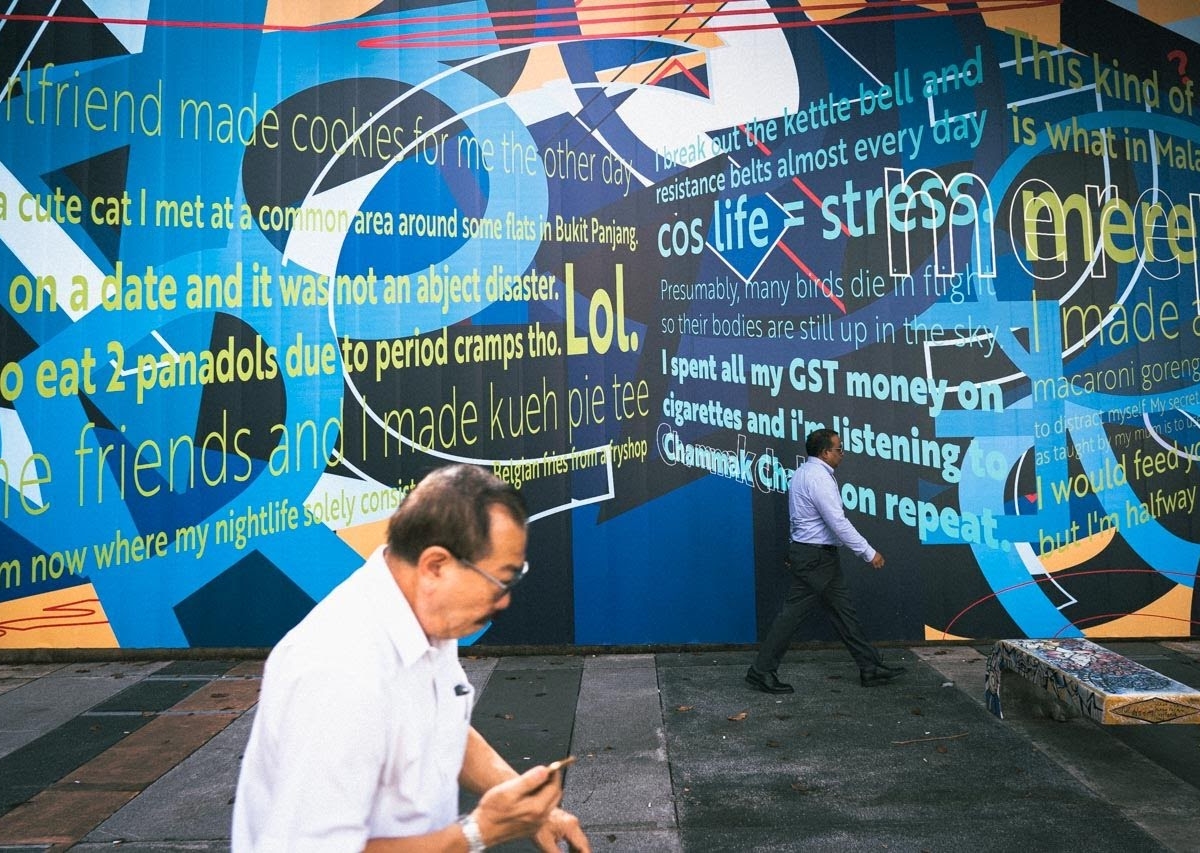Top image: Zachary Tang / RICE File Photo
It was a couple of years ago, at my grandmother’s wake, that I realised that I might have a bit of an unhealthy relationship with work.
I’d been working remotely from the back of the funeral hall when I finally looked up after completing some tasks that—let’s be real—weren’t really that important. I saw my other Singaporean cousins doing the same. They’d even found power points for their laptop chargers and created a workstation of sorts. Meanwhile, my cousins from Malaysia were busy folding joss paper.
ADVERTISEMENT
Seeing my workaholic tendencies mirrored back at me was a sobering jolt. Were we really glancing at Slack notifications while popo lay in her casket just 20 metres away?
My then-boss didn’t ask me to work through the wake. I’d volunteered to do so to save my colleagues the trouble of reshuffling our work roster and duties. My cousins, presumably, had done the same.
Now, one might argue that we’re outliers. But when I asked seven workers—including a part-time financial advisor, a public servant, and a printer support staff—if Singaporeans generally have a healthy relationship with work, the answer was a unanimous no.
As Bryan Lim, a 33-year-old editor, puts it: “There is still that mindset and belief instilled by the older generation that we should work as hard as possible because our hard work equals success—which we know now is not true.”
“There is also the belief that we are lucky enough to be employed. There is some truth in that, but people often take that to the extreme to the cost of their physical or mental health.”
Yes, we are good workers. But the truth is that lots of us are unhappy at work. Millennials and Gen-Zs are basically the burnout generation.
Slowly but surely, the anti-work movement has taken root amongst us. People are also quitting jobs without backup plans just so they can rest.
Even among those who remain in the workforce, there’s a general cloud of malaise. How many of us were truly happy to return to the office after the recent year-end holidays?
I don’t think we are the problem. Neither is work. Perhaps the real issue is how we were taught to think about work—as vocations worth suffering and sacrificing for—and what we expect in return.
The ‘Love Your Job’ Myth
We’ve all heard the old cliche: “Find a job you enjoy doing, and you will never have to work a day in your life.”
There’s an underlying assumption that work is supposed to be tough. And loving your job will somehow cancel out all the bits that make work hard.
In reality, this isn’t always the case. Yan*, a 50-year-old quantity surveyor, admits: “I genuinely love my job and my colleagues, but the ever-increasing workload has left everyone struggling. Unfortunately, management dismisses our concerns, viewing them as mere complaints.”

She’s worked for the same company her entire career. Twenty years ago, she handled five to six projects at a time. Now she has over 35. Her salary has been stagnant for 10 years. Yan has tried to apply elsewhere, but her lack of diverse experience has been her stumbling block. Maybe Yan loves her job, but I don’t think it loves her back.
ADVERTISEMENT
It can be a rude shock when you realise your love isn’t reciprocated—or worse, when it’s exploited. Esme Sedket, who works part-time as a financial advisor, tells me that that’s a big part of why she isn’t working in the animation industry.
The 23-year-old estimates that 80 to 90 percent of her animation classmates from polytechnic don’t end up working in the industry because they simply aren’t paid fairly. Those who do try to pursue their passions end up accepting shitty jobs to break into the industry.
“One classmate who ended up working in the industry eventually left. Even I was earning more than her, and I was working in F&B then,” she says incredulously.
“It was very disheartening to see someone who sits in front of the laptop for eight to 12 hours a day, giving up a lot of their health, putting a lot of stress onto themselves, and still earning less than someone in an entry-level F&B service job.”
It’s a tale as old as time for anyone in a creative industry, be it media, writing, or acting. Some companies think they’re already doing you a favour by paying you to pursue your passion. And, unfortunately, even if you turn down the job, some poor sod out there will happily take it for the sake of pursuing what they love.
Even when our colleagues and employers are great, loving your job sometimes comes with the torturous feeling of not being good enough. One pitfall of being emotionally invested in your work is that when things invariably don’t go your way, you beat yourself up. Funnily enough, when I wrote about the eternal anxiety I feel as a writer in the media industry, I received an email from an industry peer with some sage advice: “Give less of a shit.”
Undoing entrenched mindsets about work, however, is easier said than done.
Can We Find True Joy in Labour?
Of course, I’m not saying that we shouldn’t love our jobs. That’s well and good. But we have to understand that a job is not going to magically guarantee satisfaction, personal growth, and self-worth. Heck, these things can even come from outside of work.
Mohamed Ibrahim Shah, 25, is the most enthusiastic printer support staff I’ve ever met. The Fujifilm employee happily dispenses printer tips to me for free and tells me he’s on a mission to prove that printers are not a sunset industry.
But work isn’t his whole world.
“When I’m not working, I volunteer in the mental health space. I volunteer in the printing space. I even read books. I wouldn’t say work encompasses all aspects of my life. I will say it is a piece to the puzzle.”
For others, joy doesn’t exactly come from work but from the freedom it affords.

Bryan was laid off from his dream job as an entertainment reporter last year. Soon after, he secured a job in content curation, aggregating articles from content partners onto the company’s page. It’s been an emotional rollercoaster going from what he calls the “best job of his career” to a different gig.
ADVERTISEMENT
“I think the biggest positive, though, is that the current job I have now pays a lot better. I can start planning for adulthood, planning for my future, and planning for a life. Things like buying a house and building up my savings.”
Likewise, Isaac Tan, who went from a gruelling investigator position at a statutory board to a cushy market reporter job at a petrochemical firm, says the pay raise and more flexible hours have been a welcome perk. The job doesn’t sound terribly exciting, but he’s now more free to pursue his hobbies like judo and swimming.
“More than the job itself, I would say that I like the lifestyle it gives me,” he tells me. “My ‘me’ used to be my job—investigations. Now my ‘me’ means all kinds of other things.”
As for me, I think I’m slowly beginning to realise that perhaps what I love isn’t exactly my job per se—it’s writing and speaking to people. Sure, I do a lot of it at my job. But I can definitely do it outside of work, too.
To avoid falling into the ‘love your job’ trap, ask yourself: What specifically do you love about your job? Can you find those things elsewhere? What are your deal breakers?
What Are We Working For?
For most of us, work isn’t a choice. We do it to procure the resources we need to survive.
However, work seems to serve a dual purpose. Besides income, we’ve been taught that it should also give us purpose in life. A reason to get out of bed in the morning and pile onto the MRT, all groggy and bleary-eyed.

If we’re going to be re-examining work’s place in our lives, maybe we should also talk about whether it’s healthy for us to derive our purpose in life from work.
For example, Amber, a 31-year-old public servant, does not dream of labour. She says bluntly: “If money weren’t a factor, I wouldn’t work because I dislike office politics, which inevitably arises when people gather in a workplace. I live for the weekends.”
Maybe a few decades ago, when degrees weren’t ubiquitous, working hard in school might have set you on the path to financial stability. Now, even after studying hard and internmaxxing, young Singaporeans are slowly realising that we might be more dispensable than we thought. We’re also coming to terms with the fact that we might be less successful than our parents.
Besides payday every month, is there any inherent value that work adds to our lives? Why are we dedicating decades of our lives to the pursuit of work?
ADVERTISEMENT
Louis Puah is something of an expert on the matter. The 34-year-old runs two social enterprises: Praxium, which equips youths with career development and life skills, and Crater, which works with schools on transformation and education innovation.
For Louis, there’s a distinction between what you should pursue for your hobby and your work. Knowing the difference can help you find a more meaningful job.
“The idea of doing something plainly because I like it and I’m interested in it—I can do that in my hobby time if it’s a completely self-serving motivation. But if I want to do it for work, I need to think about who am I serving.”
“It’s a bit too idealistic to believe that you can have a job that exists to make you happy. You are paying the bill in that case.”
Even jobs like receptionists, which have been labelled a “bullshit job” by some, have a purpose, he says—to give your customers a good experience from the moment they step through your doors.

Even if you’re working a “boring” job like Isaac (his words, not mine), purpose can come from doing your boring job well, he muses.
“The satisfaction I get from my job is knowing that I’ve done a good job. The subject matter isn’t as important. At least for me, work is the thing that keeps me sharp and mentally focused. If I simply had leisure time all the time, that would make it meaningless and pointless.”
Louis puts the same sentiment across more succinctly: “Some people say there’s more to life than work, but I think there’s more to life than just hanging out with people, so perhaps life is about both of them.”
Rethinking Work
Striving for career progression has long been a norm, making it easy to feel like a trapped cog in an unyielding machine. Dismantling the machine isn’t an option (yet). The reality is that most of us in the working class will remain there unless we score a TOTO jackpot.
What we can dismantle is the toxic rhetoric we’ve been fed about work—that we should hustle to achieve career success at all costs, that our lives have to be spent creating value for shareholders, and that work should be our top priority.
It is not your duty to find a job that you love. Neither are you a failure if you don’t. And you definitely don’t have to suffer for the sake of pursuing a job that you love.
You don’t even have to work a standard full-time job. Esme says she’s considering taking several part-time jobs instead, splitting her time between being a financial advisor, tarot readings, and other freelance work. And honestly, more power to her.
There’s no right or wrong when it comes to choosing what you do for work. There’s only what’s right for you. Whether you’re in it for the money, like Amber, or working your dream job, like Ibrahim, what will keep you happy and motivated is knowing why you’re doing what you’re doing.
Being unhappy at work doesn’t have to be the status quo. We just have to work on undoing it.
*Name has been changed for anonymity





